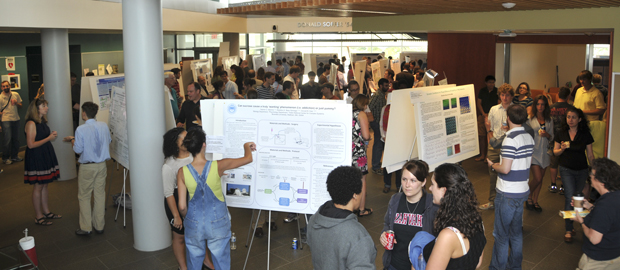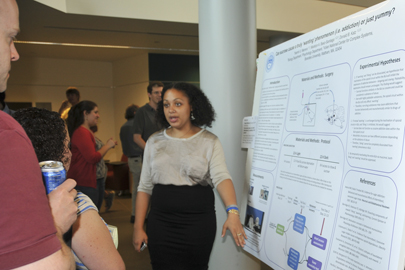A summer exploring genes, sugar addiction and more
Funded research fellowships help students evaluate future careers
 Photos/Ed Dougherty
Photos/Ed DoughertyThe Division of Science held its annual Scifest, bringing together undergraduate summer researchers across disciplines in a poster session, on Aug. 2.

Yasmin Marrero '14 answers questions about her research into sucrose and addiction.
Exploring topics such as how gene regulation works and whether sucrose can be as addictive as cocaine, 55 students chose to spend their summer with test tubes and microscopes, with research funding secured from a variety of sources: Summer Science Undergraduate Research Fellowships, Jordan-Dreyer Summer Research Assistantships, National Institute of Drug Abuse Computational Neuroscience Traineeships, Cell and Molecular Visualization Research Experience for Undergraduates, POSSE, Materials Research Science and Engineering Center Research Experience for Undergraduates, World of Work Fellowships, Lerman-Neubauer Fellowships, Physical Science Scholars, the Howard Hughes Medical Institute and by several individual research grants.
Each summer, these researchers come together to present at the Summer Scifest, an undergraduate research poster session in which students across disciplines present their work to one another and faculty.
“Research is really fun,” says Nate Shammay ’14, who has spent the summer trying to better understand gene regulation. “Looking at new questions and saying ‘How can I answer these?’ or at least get an idea of what the answer may be. It’s exciting.”
At the Scifest, Shammay was eager to answer questions on his work, “Observing Single Molecules of Lac repressor in Action.” He was one of 53 students to present research in the Shapiro Science Center atrium.
“I get butterflies before an event but once I’m here I get in the zone talking about something I’ve immersed myself in so deeply,” he says.
Early in Shammay’s Brandeis career, he inquired about working in the lab of Professor Jeff Gelles, the Aron and Imre Tauber Professor of Biochemistry and Molecular Pharmacology, but was told there was no room for undergraduates at that time. Shammay persisted and his third email to Gelles got him an interview and spot in the lab. He’s worked in the Gelles Lab ever since.
This summer, funded by a Cell and Molecular Visualization Research Experience for Undergraduates, Shammay studied in vitro transcriptional regulation mechanisms of the Lac repressor in E. coli.
He has long hoped to study dentistry, but his research, combined with tutoring he’s done recently, has made him at least give those plans a second thought.
“As time goes on, I think maybe I should teach at a university,” Shammay says, and one of the students he tutors stops by his table to hear him run down his research.
Yasmin Marrero ’14, whose research on addiction is being funded by a Summer Science Undergraduate Research Fellowship, has been developing an experiment that questions neurochemical and behavioral similarities of sucrose and cocaine addiction, which she plans to expand into a senior thesis project.
Her poster, “Can sucrose cause a truly ‘wanting’ phenomenon (i.e. addiction) or is it just yummy?” laid out her curiosities relating to the accessibility of sucrose.
“We are simply trying to understand how we process taste,” Marrero says. “We want to understand why we like sweet things and how can our brain tell that sweet is hedonic and enjoyable?
“Past generations didn’t have the same access to sucrose that we do – we can go to the store and get a big can of Coke,” she says, noting that her experiment will separate the wanting of sucrose from the liking of sucrose in rats. Her summer has been spent caring for the rats, getting them accustomed to human interaction and performing surgeries on them to implant electrodes.
Part of her experiment will inhibit basolateral amygdala subsystems in allegedly sucrose-addicted rats while the rats engage in tasks thought to be driven by liking or wanting.
“Before I came to Brandeis I didn’t want anything to do with neuroscience and look at me now,” says Marrero, who has been working in the Professor Donald Katz’s Behavioral, Learning, Electrophysiology, Chemosensory Lab this summer. “It seemed like such a nightmare, so fragile. Now I think, ‘How fragile but how interesting.’ Everything connects back to the brain.”
Marrero says she’s become a lot more open-minded about her future career in the sciences.
“It really showcases the students’ enthusiasm and the commitment to their work,” Professor Eve Marder, the Victor and Gwendolyn Beinfield Professor of Neuroscience and head of the Division of Science, says of the Scifest. “It’s a very professional level of work – very challenging and rewarding – and a useful vehicle for them” to see whether the work is viable for them as a future career.
The summer research fellowships also give students from other institutions a chance to try a hand at research their home institution may not offer. Eighteen of the 55 Division of Science Summer Research Fellows are not Brandeisians.
Victoria Wu, who is transferring from Smith College to Brown University this year, came seeking a new experience with the Materials Research Science and Engineering Center Research Experience for Undergraduates program.
She hoped her work “Characterizing the effect of ATP concentration on the in vitro dynamics and self-assembly of microtubules,” in the lab of Bulbul Chakraborty, the Enid and Nate Ancell Professor of Physics, would help her decide between a career in research versus industry. She says it’s certainly helped, and now she’s looking for an experience in industry to help further narrow her options.
In addition to helping inform career options, Marder says she hopes the researchers learn that science can be fun. That’s no surprise to Shammay, who ends a presentation of his research with a big smile.
“Isn’t that cool?” he asks, ready to field more questions.
Categories: Research, Science and Technology





